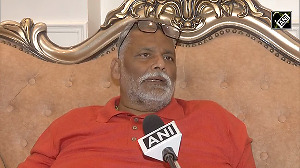With Pakistan President General Pervez Musharraf having declared general elections in January 2008, the establishment-driven Pakistan Muslim League-Q is optimistic to win, a majority -- albeit razor-thin -- to form yet another hung Parliament.
The intelligence agencies who midwife this outfit -- known as the Kings Party -- peopled by leaders handpicked from Nawaz Sharif's Pakistan Muslim League-N after his regime was toppled in 1999, are quite upbeat that their brainchild would help them continue their 'Save Musharraf' policy.
The spy bosses' are trying to bring back the PML-Q to power at a time when the opposition parties have not yet made their mind about whether to go for elections. Even the senior leaders of the PML-Q show cautious optimism in this regard.
"There is a 60 percent chance that election would be held," a top party leader said.
Notwithstanding Musharraf's eight-year long repression and his military activism for reining in judiciary and media coupled with sky-rocketing inflation, price hike, employment that badly hit masses, there are still hopes that the people could be befooled one more time.
Head of the Intelligence Bureau Brigadier Ejaz Shah is busy drafting a plan on how to strategise the rigging in polls.
Shah is the buddy of Musharraf and hence assumes a significant role in the political game. He is also considered very close to the Chaudhrys of Gujarat -- PML-Q president Chaudhry Shujaat Hussain and Chief Minister Punjab Chaudhry Pervez Elahi (both are cousins and also brothers-in-law).
On other hand, Benazir Bhutto considers Ijaz Shah as the worst enemy and put his name in the list of those who could endanger her life. A former home secretary of Punjab who arrested Daniel Pearl's alleged murderer Omer Saeed Sheikh, Shah's political ambitions is no the closely guarded secret it used to be.
He had managed to win the slot of District Nazim, Nankana Sahib (a holy city of Sikh community) for his uncle, Mumtaz Shah in 2006. His brother, Tariq Shah, who had resigned from government service just two year back with an aim to jump into political fray, is now flexing muscle to grab a PML-Q ticket.
There are also reports indicating that Shah would be the intelligence in-charge of operations in Punjab during the general polls. The last operational chief of Punjab Brig Aslam Ghumman, who played a crucial role in installing Chaudhry Pervez Elahi as the chief minister of Punjab, is now the director-general of anti-corruption, Punjab.
Ghumman, whose younger brother, Azeem, was also elected as a member of provincial assembly in 2002, was head of ISI's Punjab chapter by that time.
Ejaz Shah was then home secretary of Punjab. He considers himself an expert on the political culture of Punjab, the biggest province of Pakistan that plays a vital role in deciding the fate that who would rule at the Centre.
Out of the 342 seats in the National Assembly of Pakistan, 272 are directly contested seats and the rest are reserved for women and minority members. Punjab has total of 148 directly contested seats. This is 52 per cent of the seats in the national assembly.
Punjab is followed by Sindh, home province of Benazir Bhutto, with 61 national assembly's directly contested seats. Then comes the North West Frontier Province, the home province of former opposition leader Maulana Fazal-ul-Rehman, with 35 seats.
Baluchistan has a share of 14 seats, Federally Administered Tribal Areas 12 seats and the Federal Capital (Islamabad) two seats.
Ijaz Shah believes the PML-Q will bag 80 national assembly seats from Punjab, a top party leader said, referring to a recent meeting with Shah.
However, the party leadership is rather more optimistic than Shah. Chaudhry Pervez Elahi believes his party will win 120 national assembly seats from Punjab. His elder cousin, Chaudhry Shujaat, estimates between 80-120 seats.
The PML-Q has no dedicated vote bank in the absence of any charismatic leader. Its optimism is based on winning candidates, who, though they do not have national stature, are considered influential in their constituencies.
The party leaders do not contest the claim of Benazir Bhutto's popularity in Punjab but they say her party candidates are relatively weaker than that of PML-Q. Nawaz Sharif also enjoys tremendous popularity in Punjab. That he was kept out of Pakistan for a long time worked out in favour of the PML-Q.
According to political observers, the PML-Q would face public wrath for Musharraf's policies. His popularity graph can be imagined from a public opinion poll conducted by Gallop Survey. The survey conducted after he had taken over in October 1999, reported widespread approval for the General with 67 percent favouring him.
A survey conducted after his second coup won him strong disapproval with 67 percent condemning his desperate act and terming him part of problem. His sacking of an independent judiciary made him a villain.
However, the ruling party leadership disagrees Musharraf's image will affect it. They say the surveys are usually based on the opinion of those living in urban areas where people are considered to be well-informed and literate. The PML-Q is therefore concentrating on the rural population, mostly illiterate and economically impoverished, they say.
As far as other provinces are concerned, the PML-Q and its allied parties would field joint candidates.
For example, in Sindh, it would contest along with the MQM and the PML-Functional.
Its leadership expects a tough competition there as Sindh is considered a stronghold of Benazir Bhutto.
About NWFP, it estimates to win around half of the total seats. But the political observers differ with this perception because the province is fast becoming a stronghold of pro-Taliban people and with anti-US sentiments at an all-time high.
About Balochitsan, the ruling party's optimism is based on mega development projects initiated there. But Baloch nationalist parties are likely to put up strong resistance to the pro-Musharraf PML-Q. The situation in FATA, presently a war zone with tribal militants in a confrontation with the military, is also likely to bring bad news for Musharraf's political allies.





